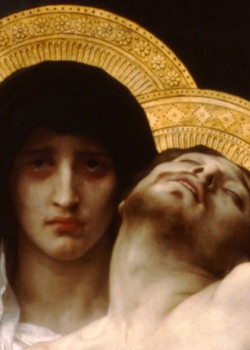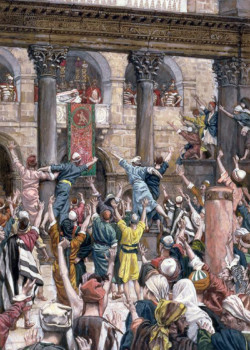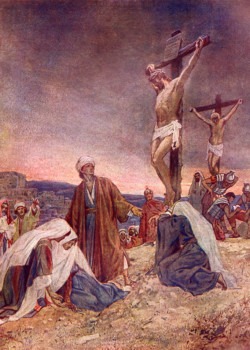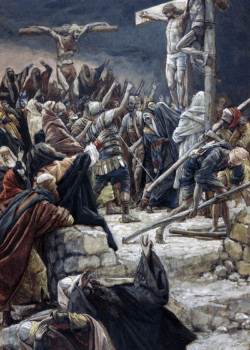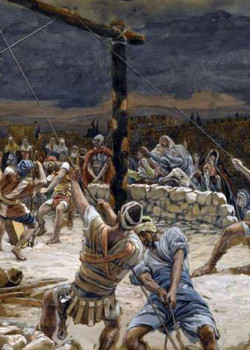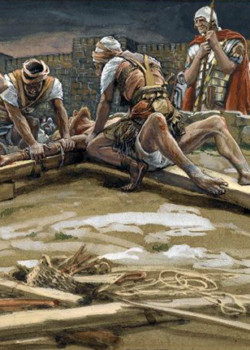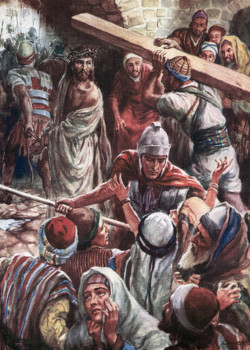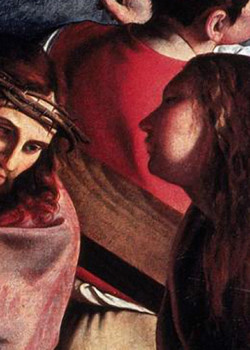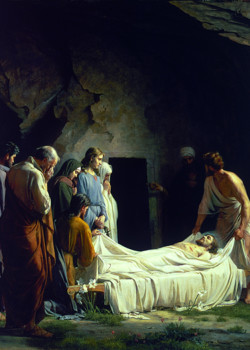The Women Remained
After Mary left, the other women withdrew for a short distance and remained in attendance upon Jesus until he expired on the cross, and they were yet standing by when the body of the Master was taken down for burial. ~ The Urantia Book, 187:4.8
All of this was Man's Doing
It was man and not God who planned and executed the death of Jesus on the cross. True, the Father refused to interfere with the march of human events on Urantia, but the Father in Paradise did not decree, demand, or require the death of his Son as it was carried out on earth. It is a fact that in some manner, sooner or later, Jesus would have had to divest himself of his mortal body, his incarnation in the flesh, but he could have executed such a task in countless ways without dying on a cross between two thieves. All of this was man's doing, not God's. ~ The Urantia Book, 186:5.2
My son, behold your mother!
Just after the repentant thief heard the Master’s promise that they should sometime meet in Paradise, John returned from the city, bringing with him his mother and a company of almost a dozen women believers. John took up his position near Mary the mother of Jesus, supporting her. Her son Jude stood on the other side. As Jesus looked down upon this scene, it was noontide, and he said to his mother, “Woman, behold your son!” And speaking to John, he said, “My son, behold your mother!” And then he addressed them both, saying, “I desire that you depart from this place.”~ The Urantia Book, 187:4.7
Lord, remember me
One of the brigands railed at Jesus, saying, “If you are the Son of God, why do you not save yourself and us?” But when he had reproached Jesus, the other thief, who had many times heard the Master teach, said: “Do you have no fear even of God? Do you not see that we are suffering justly for our deeds, but that this man suffers unjustly? Better that we should seek forgiveness for our sins and salvation for our souls.” When Jesus heard the thief say this, he turned his face toward him and smiled approvingly. When the malefactor saw the face of Jesus turned toward him, he mustered up his courage, fanned the flickering flame of his faith, and said, “Lord, remember me when you come into your kingdom.” And then Jesus said, “Verily, verily, I say to you today, you shall sometime be with me in Paradise.” ~ The Urantia Book, 187:4.1
Lingering Torture and Slow Death
When they had hoisted this crossbeam up on the post, and after they had nailed it securely to the upright timber of the cross, they bound and nailed his feet to the wood, using one long nail to penetrate both feet. The upright timber had a large peg, inserted at the proper height, which served as a sort of saddle for supporting the body weight. The cross was not high, the Master’s feet being only about three feet from the ground. He was therefore able to hear all that was said of him in derision and could plainly see the expression on the faces of all those who so thoughtlessly mocked him. And also could those present easily hear all that Jesus said during these hours of lingering torture and slow death. ~ The Urantia Book, 187:2.1
They Nailed His Hands
The soldiers first bound the Master’s arms with cords to the crossbeam, and then they nailed his hands to the wood. ~ The Urantia Book, 187:2.1
Simon the Cyrene Never Knew...
This man Simon had come all the way from Cyrene, in northern Africa, to attend the Passover. He was stopping with other Cyrenians just outside the city walls and was on his way to the temple services in the city when the Roman captain commanded him to carry Jesus’ crossbeam. Simon lingered all through the hours of the Master’s death on the cross, talking with many of his friends and with his enemies. After the resurrection and before leaving Jerusalem, he became a valiant believer in the gospel of the kingdom, and when he returned home, he led his family into the heavenly kingdom. His two sons, Alexander and Rufus, became very effective teachers of the new gospel in Africa.But Simon never knew that Jesus, whose burden he bore, and the Jewish tutor who once befriended his injured son, were the same person. ~ The Urantia Book, 187:1.10
The Women Lamented
As the death procession passed along the narrow streets of Jerusalem, many of the tenderhearted Jewish women who had heard Jesus’ words of good cheer and compassion, and who knew of his life of loving ministry, could not refrain from weeping when they saw him being led forth to such an ignoble death. As he passed by, many of these women bewailed and lamented. ~ The Urantia Book, 187:1.6
Jesus is Turned Over to the Soldiers
As soon as Jesus was turned over to the Roman soldiers by Pilate for crucifixion, a messenger hastened away to Gethsemane to inform David, and within five minutes runners were on their way to Bethsaida, Pella, Philadelphia, Sidon, Shechem, Hebron, Damascus, and Alexandria. And these messengers carried the news that Jesus was about to be crucified by the Romans at the insistent behest of the rulers of the Jews. ~ The Urantia Book, 186:3.2
The Burial Procession
At about half past four o'clock the burial procession of Jesus of Nazareth started from Golgotha for Joseph's tomb across the way. The body was wrapped in a linen sheet as the four men carried it, followed by the faithful women watchers from Galilee.
.....
They carried the body into the tomb, a chamber about ten feet square, where they hurriedly prepared it for burial.
~ The Urantia Book, (188:1.3)
Reciting The Psalm
Jesus... did not feel that the Father had forsaken him; he was merely reciting in his vanishing consciousness many Scriptures, among them this twenty-second Psalm, which begins with "My God, my God, why have you forsaken me?" And this happened to be one of the three passages which were spoken with sufficient clearness to be heard by those standing by.
~ The Urantia Book, (187:5.2)

